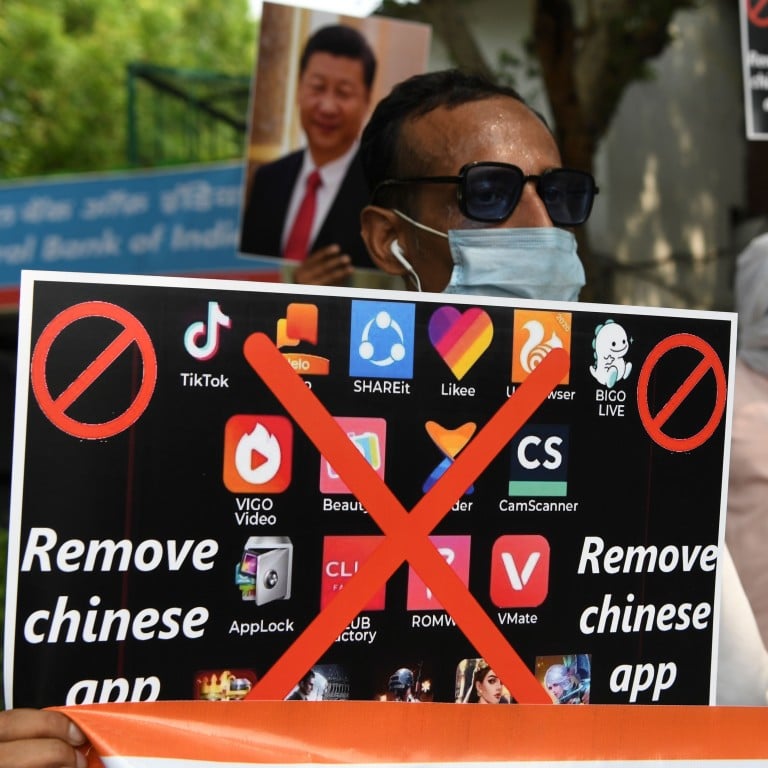
India’s app ban raises the stakes for China’s global tech ambitions amid rising geopolitical tensions
- Chinese tech companies have worked hard to penetrate the digital market of Asia’s second-biggest developing economy, with considerable success
India’s recent ban of Chinese apps amid rising tensions on the two countries’ disputed Himalayan border is raising the stakes for many Chinese tech firms, such as ByteDance and Huawei Technologies Co, which have ambitions to grow their footprint in India and beyond, according to some analysts.
In recent years, Chinese tech companies have worked hard to penetrate the digital market of Asia’s second-biggest developing economy, with considerable success in some areas – for example, four out of the top five smartphone makers in India are Chinese.
But that progress is now under threat after India banned 59 Chinese apps and amid a broader anti-China public backlash following the deadly military clash last month.
“If India gets closed off, this could become a signal for many other countries in the world,” said Dev Lewis, a fellow at Hong Kong-based think tank Digital Asia Hub. “Maybe if you look at some African countries … and other countries in Southeast Asia, they could see this as a precedent for how they deal with Chinese tech companies.”
The India ban is a big blow for Chinese app providers in one of the world’s largest app markets, with red-flagged products including viral short video hit TikTok, live-streaming platform Bigo Live, the Zoom videoconferencing app, microblogging platform Weibo, and Tencent Holdings’ social video app Kwai and multipurpose social messaging app WeChat.
A number of African ambassadors wrote to China’s foreign minister earlier this year to protest after some African students and expatriates in the country were reportedly evicted from their homes and mistreated over fears they could spread the novel coronavirus. Africa has been another popular destination for Chinese tech investment in recent years.
The Economic Times also reported that India is considering the mandatory display of “country of origin” on goods sold on e-commerce platforms to further clamp down on Chinese tech and support domestic products.

03:08
India bans dozens of Chinese apps, including TikTok and WeChat, after deadly border clash
“In the short-term, China’s tech companies will need to turn up the charm offensive and do everything they can to mollify the concerns of foreign governments and citizens,” said Mark Natkin, managing director of Marbridge Consulting in Beijing. “If they can get past peak periods of geopolitical tension without losing too much ground, then their long-time users, local partners, or other interested parties may help push for the ban to be overturned.”
“In the long-term, they would probably be prudent to diversify into a greater number of developing markets,” added Natkin.
India has designated the banned Chinese apps as national security and data privacy threats, saying these apps have “engaged in activities which are prejudicial to sovereignty and the integrity of India, the defence of India, security of state and public order”.
Xiaomi, ZTE, Oppo and Huawei declined to comment on geopolitical risk and their future plans in the Indian market. Alibaba Group Holding and ByteDance did not immediately reply to a request for comment. Alibaba owns the South China Morning Post.
“I think the fact that these apps have already been around for a long time and some of them have more than 100 million users, suggests that the timing of the move is more to do with the border tensions and not because of the other issues of privacy or data security,” said Ananth Krishnan, a former Brookings India fellow who wrote a March report arguing for more effort in India to safeguard its longer-term security and privacy when dealing with the rise of China tech.
India said to dissuade telecoms network operators from buying Huawei, ZTE gear
“India was already moving towards tighter restrictions on foreign tech firms to help foster the development of local champions, but the recent fighting along the disputed border … has precipitated even greater scrutiny of Chinese companies and prompted India to re-evaluate cybersecurity measures,” said Natkin.
Chinese tech companies and venture capital firms have invested heavily in the Indian market. According to research firm Gateway House, Chinese tech investors have put an estimated US$4 billion of investments in Indian start-ups. Chinese tech giant Alibaba has invested in Indian e-commerce company Snapdeal, digital wallet Paytm and food delivery platform Zomato. Tencent has backed Indian messaging company Hike and ride-hailing app Ola. Over the past five years, 18 of India’s 30 unicorns were Chinese-funded, according to Gateway House.
“For the last four years, starting from about 2016, we saw a big rise in Chinese tech investment into India as China’s domestic market began to get saturated … the Indian market is the only other market comparable to China, and Chinese investors and companies know that, which is why they’ve been investing,” said Lewis from Digital Asia Hub.
India’s TikTok ban threatens China’s rise as a global tech power
Although Chinese investment has filled a gap in India’s tech start-up scene, amid a lack of new domestic tech titans, some analysts see a definite change in direction going forward.
“India and China have tried to keep the relationship of trade investment and technological cooperation separate from the boundary dispute … but I think that is no longer possible,” said Krishnan. “If there are more border incidents, it will impact policy, how companies function … it will impact the investment environment.”


